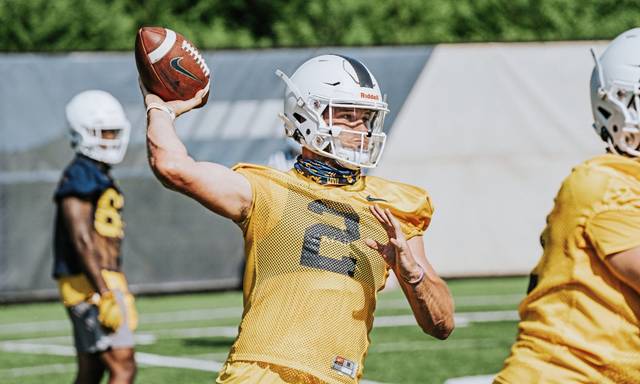https://development.triblive.com/sports/wvus-neal-brown-sees-demeanor-change-as-mountaineers-open-football-drills/
WVU's Neal Brown sees 'demeanor' change as Mountaineers open football drills

Neil Brown was in a familiar place Monday.
Surrounded by his team, beard stubble around his chin. (Who has time to shave?) Instructing groups of (socially distanced) players.
It was the first day of football practice at West Virginia. For now, all was right in his world.
“You see guys, their demeanors have changed,” said Brown, eager to dig into his second season as WVU coach. “They have something to look forward to. Our guys have new energy.
“They’re able to get off their phones. They’re able to get away from all the uncertainty, and they’re really going to do what they love to do. That’s been a positive experience, and I hope it continues.”
But will it?
That’s a question without an answer at the moment while Power 5 leaders discuss the fate of the 2020 season in the midst of the coronavirus.
Said Brown, with clear conviction: “We’re going to get ready to play until somebody tells us that we’re not going to.”
The good news is the WVU football program has no active cases of covid-19, Brown said, after reporting 28 on July 19.
“Now, the mission is to stay well. Stay well and get ready,” he said.
Brown was pleased to see his players joining other college players in the nationwide #WeWantToPlay movement that has gained steam on social media. He said he had nothing to do with his players’ involvement Sunday — he was with his daughters at a softball tournament — but he monitored it closely.
“I stayed awake way later than I usually do or wanted to,” he said, “just because I was moved by the actions, not only by our players but players across college football.”
The next morning, it was back to work, but with new procedures surrounding practice because of the virus.
“We respect the virus. I talked about that a bunch with our team,” Brown said. “I also believe in the protocols we have in place to keep our players and our staff as safe as possible.”
They include:
• Players split into two groups, based on who they spend time with off the field. “We don’t do anything longer than 10 minutes,” Brown said.
• Virtual meetings.
• Outdoor weightlifting.
• Outdoor meals and to-go containers.
• Helmets with a splash guard and shield, along with gaiters for increased protection.
• The team has gone as far as abandoning the locker rooms.
“I think we can make it work in the fall. I think it’s doable,” Brown said. “I think we can do it in a safe manner.”
Practices might not be as physical initially as players get in shape and reacquaint themselves with the speed of the game.
“We’re not in shape as we normally would be going into a season,” he said. “We’re being more careful now.”
Ultimately, Brown understands higher powers could cancel the season, delay it or postpone it to the spring.
He said playing in the spring also is “doable,” but it creates eligibility questions that administrators need to answer.
“I don’t know if we need to get into that mode until we have to,” he said.
But going silent in the fall could create another set of problems, he said.
“What’s the plan if we don’t play? How do we handle (the student-athletes)?
“Before we make a decision about, ‘Are we going to play or not going to play,’ we have to make a decision on what it looks like if we don’t play.
“If we make that decision, which I’m against, we have to have a clear plan on how we’re going to move forward in this semester with these guys. And it can’t be, ‘Hey, we’re not playing. Oh, I don’t know. I don’t know. I don’t know.’ That doesn’t work. (Players) are tired of that. They’re tired of ‘I don’t knows.’ ”
There is a growing sentiment among many college players and coaches that people are safer on campus than they would be at home in an environment that isn’t as regulated.
“If we’re not playing football, are they getting tested once or twice a week? I’m going to say probably not,” Brown said. “If they’re not playing football, are they going through the same safety protocols?
“They want to work out. Are they safer doing that here than they are at the local high school or the local gym? I think absolutely (on campus) because we have experts (to work with them).
“You take them out of their athletics. You take them out of their structure. You take them out of what they really they love, what happens?”
Copyright ©2025— Trib Total Media, LLC (TribLIVE.com)
